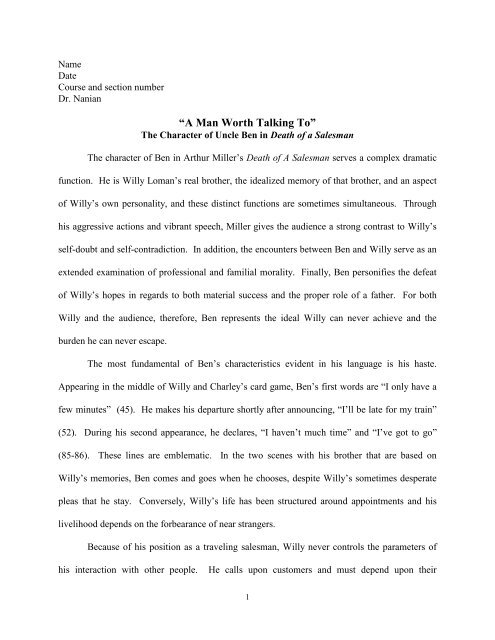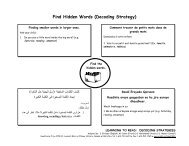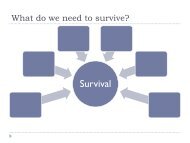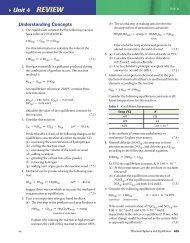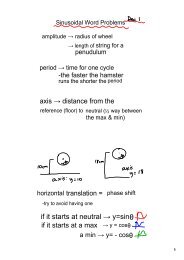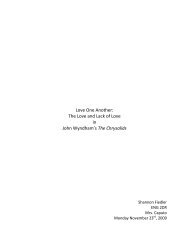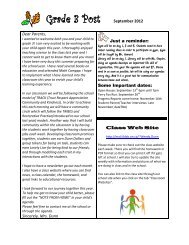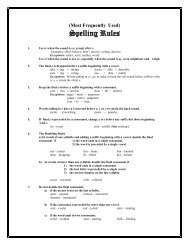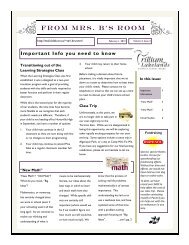university level character analysis of Ben from Death of a .pdf
university level character analysis of Ben from Death of a .pdf
university level character analysis of Ben from Death of a .pdf
Create successful ePaper yourself
Turn your PDF publications into a flip-book with our unique Google optimized e-Paper software.
Name<br />
Date<br />
Course and section number<br />
Dr. Nanian<br />
“A Man Worth Talking To”<br />
The Character <strong>of</strong> Uncle <strong>Ben</strong> in <strong>Death</strong> <strong>of</strong> a Salesman<br />
The <strong>character</strong> <strong>of</strong> <strong>Ben</strong> in Arthur Miller’s <strong>Death</strong> <strong>of</strong> A Salesman serves a complex dramatic<br />
function. He is Willy Loman’s real brother, the idealized memory <strong>of</strong> that brother, and an aspect<br />
<strong>of</strong> Willy’s own personality, and these distinct functions are sometimes simultaneous. Through<br />
his aggressive actions and vibrant speech, Miller gives the audience a strong contrast to Willy’s<br />
self-doubt and self-contradiction. In addition, the encounters between <strong>Ben</strong> and Willy serve as an<br />
extended examination <strong>of</strong> pr<strong>of</strong>essional and familial morality. Finally, <strong>Ben</strong> personifies the defeat<br />
<strong>of</strong> Willy’s hopes in regards to both material success and the proper role <strong>of</strong> a father. For both<br />
Willy and the audience, therefore, <strong>Ben</strong> represents the ideal Willy can never achieve and the<br />
burden he can never escape.<br />
The most fundamental <strong>of</strong> <strong>Ben</strong>’s <strong>character</strong>istics evident in his language is his haste.<br />
Appearing in the middle <strong>of</strong> Willy and Charley’s card game, <strong>Ben</strong>’s first words are “I only have a<br />
few minutes” (45). He makes his departure shortly after announcing, “I’ll be late for my train”<br />
(52). During his second appearance, he declares, “I haven’t much time” and “I’ve got to go”<br />
(85-86). These lines are emblematic. In the two scenes with his brother that are based on<br />
Willy’s memories, <strong>Ben</strong> comes and goes when he chooses, despite Willy’s sometimes desperate<br />
pleas that he stay. Conversely, Willy’s life has been structured around appointments and his<br />
livelihood depends on the forbearance <strong>of</strong> near strangers.<br />
Because <strong>of</strong> his position as a traveling salesman, Willy never controls the parameters <strong>of</strong><br />
his interaction with other people. He calls upon customers and must depend upon their<br />
1
Name 2<br />
willingness to see him in order to make a living. Willy’s affair with “The Woman” is only<br />
partially motivated by a need for sexual fulfillment. While she may restore his masculinity<br />
through sex, her more important function is to empower him pr<strong>of</strong>essionally, promising “I’ll put<br />
you right through to the buyers” (39). But this affair has long been over when the events <strong>of</strong> the<br />
play occur. Thus, when Willy tells Linda, “I’m vital in New England” (14), he should be<br />
speaking in the past tense. In the present, he is sexually and pr<strong>of</strong>essionally emasculated. In<br />
compensation, Willy exerts control by compulsively concluding personal encounters. Thus, in<br />
Act One, he sends Linda upstairs ahead <strong>of</strong> him. Faced with <strong>Ben</strong>’s specter, he drives Charley<br />
away by disrupting the card game. And much <strong>of</strong> his anger with Biff may result <strong>from</strong> Biff’s<br />
refusal to allow Willy to dictate the pattern <strong>of</strong> their conversation. Typically, Biff defends his<br />
mother against Willy’s anger, forcing him to walk away, “beaten down, guilt-ridden” (65).<br />
The pointlessness <strong>of</strong> Willy’s attempts at control reveals itself in Act Two, in which the<br />
recurring motif is abandonment. Howard leaves Willy behind twice in the course <strong>of</strong> their scene<br />
together, even though the scene occurs in Howard’s <strong>of</strong>fice. One would expect Willy would be<br />
told to leave, but instead in both instances Howard tells him, “pull yourself together” (82, 84)<br />
and walks out. Willy even tries to leave at one point, and Howard stops him (83). The second<br />
episode with <strong>Ben</strong> occurs at this point, concluding with another abandonment. His next encounter<br />
is with Bernard, who although kind and patient with Willy obviously has more important<br />
places to go and people to see, and leaves. Charley, who in their personal relationship<br />
demonstrates considerable forbearance in the face <strong>of</strong> constant insult, cannot give Willy more time<br />
because <strong>of</strong> the demands <strong>of</strong> business: “I got an accountant inside” (98). Finally and most<br />
devastatingly, Biff and Happy abandon Willy in the men’s room <strong>of</strong> the restaurant.
Name 3<br />
<strong>Ben</strong> is immune to abandonment, not only because it is always he who leaves, but because<br />
he has founded his own family in a far away land. Before <strong>Ben</strong> has spoken his second line in the<br />
play, Willy tells Charley that <strong>Ben</strong> had seven sons (45). Miller’s choice <strong>of</strong> seven sons (with no<br />
mention <strong>of</strong> presumably irrelevant daughters) places <strong>Ben</strong> in the tradition <strong>of</strong> biblical patriarchs.<br />
Revealingly his last name is never spoken in the play, and even in the list <strong>of</strong> <strong>character</strong>s he is<br />
merely “Uncle <strong>Ben</strong>,” not “<strong>Ben</strong>jamin Loman,” though <strong>of</strong> course logically that is what his name<br />
must be. But far <strong>from</strong> being a “low man,” <strong>Ben</strong> is a mythic figure with origins in Judaic antiquity.<br />
The existence <strong>of</strong> his sons also explains why Willy cannot expect to inherit anything <strong>from</strong> his<br />
brother’s estate and contrasts with Willy’s own failures as a patriarch. <strong>Ben</strong> has left everything to<br />
them, and thus provided them with wealth and advantages that Willy cannot provide Biff and<br />
Happy.<br />
<strong>Ben</strong>’s wealth is part <strong>of</strong> his mythic quality. In both <strong>of</strong> the episodes that Willy remembers,<br />
<strong>Ben</strong>’s final word is “rich” (52, 87). The origins <strong>of</strong> his wealth are obscure, presented as they are<br />
in two completely different ways. First, he almost precisely repeats the tale <strong>of</strong> walking into the<br />
jungle at seventeen and walking out at twenty-one having made a fortune. But this is not an<br />
explanation, it is “an incantatory formula” (Jacobsen 251). Key to this formula is the reference<br />
to God: “And by God I was rich” (50, 52). This places the responsibility for success in other<br />
than human hands, and thereby renders pointless any advice Willy might ask for. However, we<br />
can hear an intimation <strong>of</strong> a more prosaic truth behind <strong>Ben</strong>’s success in the practical advice he<br />
gives Biff “Never fight fair with a stranger, boy. You’ll never get out <strong>of</strong> the jungle that way”<br />
(49) and conclude that God had little if anything to do with <strong>Ben</strong>’s success after all.<br />
Some critics expand <strong>Ben</strong>’s public amorality to cover the personal and intimate aspects <strong>of</strong><br />
his life: “Apparently indifferent to social relationships, he needed neither the human warmth <strong>of</strong>
Name 4<br />
the family nor society’s positive response. His sphere <strong>of</strong> action related to things and quantities<br />
rather than people; even his seven sons seemed more like commodities than members <strong>of</strong> a<br />
family” (Jacobsen 250). This is inaccurate. It is Willy Loman, not <strong>Ben</strong>, who endlessly<br />
quantifies: “That is a one-million-dollar idea!” (63). “Ask for fifteen. How much you gonna<br />
ask for? . . . Don’t be so modest. You always started too low” (64-5). “Can you imagine that<br />
magnificence with twenty-thousand dollars in his pocket?” (135). Willy literally attaches a<br />
numerical sum to his own life: “a man has got to add up to something” (125). Since it is Willy<br />
who numbers <strong>Ben</strong>’s sons (<strong>Ben</strong> never mentions them), any suggestion that they seem commodities<br />
comes <strong>from</strong> him. The audience has never seen <strong>Ben</strong> in a context that would reveal whether he<br />
appreciates the warmth <strong>of</strong> family or not. What we do know suggests that, at minimum, he is a<br />
good provider. In this area, <strong>Ben</strong> resembles Charley. When Willy cannot comprehend how<br />
Charley can have produced Bernard, Charley responds, “My salvation is that I never took any<br />
interest in anything” (96). Both <strong>Ben</strong> and Charley provide materially for their children, but have<br />
no desire to direct the course <strong>of</strong> their lives. In any case, it is difficult to imagine that <strong>Ben</strong>’s<br />
relationship with his sons could be much worse than Willy’s with Biff and Happy. The only<br />
inheritance Willy’s sons receive are his hypocrisies, insecurities, and desperate grasps at<br />
grandeur, which Happy accepts and Biff, after years <strong>of</strong> vacillating, finally does not.<br />
The contrasting inheritances the two brothers leave their sons are the echo <strong>of</strong> those that<br />
they received <strong>from</strong> their own father. <strong>Ben</strong> is old enough, when confronted with abandonment by<br />
his “very great and very wild-hearted” (49) father an itinerant tinker irresponsible enough to<br />
abandon his wife and children to recover and pursue his own destiny. Describing this process<br />
to Willy, he is disingenuous: “At that age I had a very faulty view <strong>of</strong> geography, William. I<br />
discovered after a few days that I was heading due south, so instead <strong>of</strong> Alaska, I ended up in
Name 5<br />
Africa” (48). One must conclude that, rejected by his father, <strong>Ben</strong> utterly rejects him in turn,<br />
running to the opposite end <strong>of</strong> the earth and founding his own dynasty in the wilds <strong>of</strong> a new<br />
continent as compensation. When he returns, he literally does not know if his parents are alive or<br />
dead.<br />
Willy, on the other hand, is too young when his father abandons the family to follow suit:<br />
When Willy also suffers the disappearance <strong>of</strong> his older brother, he nearly<br />
completely loses his self-confidence and his sense <strong>of</strong> identity as a male. His<br />
insecurity about his identity and role as a father is evident in the memory scene<br />
where he confesses to <strong>Ben</strong> that he feels “kind <strong>of</strong> temporary” (51) about himself<br />
and seeks his brother’s assurance that he is doing a good job bringing up his sons.<br />
(Centola 34-5)<br />
Left behind, Willy moves <strong>from</strong> the freedom <strong>of</strong> the west to the “talk and time payments and courts<br />
<strong>of</strong> law” (85) <strong>of</strong> the city, and becomes a salesman. Both decisions may be seen as an attempt to<br />
compensate for the loss <strong>of</strong> his father and brother by surrounding himself with people. Willy is<br />
obsessed with their opinions, and dreams <strong>of</strong> being able to make a living simply through being<br />
“known,” “respected,” and “liked.” He constantly makes a highly questionable distinction<br />
between those who are “liked” and those who are “well-liked.” Despite his apparent confidence,<br />
he is riddled with insecurity. “But they do laugh at me. I know that” (37). <strong>Ben</strong>, conversely, is<br />
“utterly certain <strong>of</strong> his destiny” (44). One suspects he is also utterly confident <strong>of</strong> his sons’ respect<br />
and untroubled at their prospects, while Willy, crippled by his own father’s desertion, agonizes<br />
over ways to make his sons successful.<br />
In the mock fight with Biff, <strong>Ben</strong> defines himself as a “stranger” (49) and acts accordingly.<br />
Yet just prior to this incident, Willy had introduced him to his sons as “your Uncle <strong>Ben</strong>, a great
Name 6<br />
man!” (48). Again, one may mistakenly interpret <strong>Ben</strong>’s actions here as utterly amoral: “<strong>Ben</strong>’s<br />
drive for self-fulfillment is undoubtedly predicated upon his denial <strong>of</strong> any responsibility for<br />
others and his repudiation <strong>of</strong> the values which Willy cherishes and associates with his<br />
romanticized view <strong>of</strong> family life and the past” (Centola 38). The difference between the two<br />
men lies more in the definition <strong>of</strong> others than <strong>of</strong> responsibility. <strong>Ben</strong> is not irresponsible; indeed,<br />
he fulfills his familial responsibilities better than Willy, with his romanticized view, does. The<br />
more significant difference lies in how the two men view the opposed concepts <strong>of</strong> family and<br />
strangers. Willy, the abandoned child, seizes any opportunity for a sense <strong>of</strong> belonging and self-<br />
justification. <strong>Ben</strong>, who has established his own line in Africa, has no need <strong>of</strong> a family back in<br />
the United States. He feels no compulsion to justify his existence. Nonetheless, perhaps out <strong>of</strong><br />
fraternal obligation, perhaps out <strong>of</strong> guilt at recapitulating his father’s <strong>of</strong>fence, perhaps simply out<br />
<strong>of</strong> nostalgia over the young boy to whom he “gave a bunch <strong>of</strong> wild flowers” (49), <strong>Ben</strong> <strong>of</strong>fers<br />
Willy the chance to work for him, and more importantly, to reunite the two branches <strong>of</strong> the<br />
family. Thus the suggestion that <strong>Ben</strong>’s amorality is absolute is clearly unfair.<br />
Miller leaves the question <strong>of</strong> why Willy rejects his brother’s <strong>of</strong>fer somewhat ambiguous.<br />
On one <strong>level</strong>, Willy is simply a different kind <strong>of</strong> man. Laurence Olivier’s famous<br />
<strong>character</strong>ization <strong>of</strong> Hamlet as “a man who could not make up his mind” is far more appropriate<br />
to Willy Loman. Willy is unable to reach conclusions about even the most banal aspects <strong>of</strong> life,<br />
for example whether it is better to laugh or not during a job interview. Given this, the chutzpah<br />
required to uproot his family and move to Alaska is no doubt beyond his capacity. Yet on<br />
another <strong>level</strong>, the presence <strong>of</strong> Linda seems to restrain him more: by “reminding him Willy <strong>of</strong> the<br />
successful career <strong>of</strong> Dave Singleman, she rekindles within him his love <strong>of</strong> the pr<strong>of</strong>ession. . .<br />
Ironically, Linda could actually be said to have hurt Willy by upholding his illusions” (Centola
Name 7<br />
37). This is true, but they are his illusions after all, and they are such a part <strong>of</strong> him that to attempt<br />
to disabuse him <strong>of</strong> them would likely have seemed too cruel for Linda to contemplate.<br />
Willy’s ambivalence and self-contradiction are compounded by the occurrence <strong>of</strong> these<br />
episodes in memory only. The audience, as indicated by the play’s original title, is inside <strong>of</strong><br />
Willy’s head. These memories are distortions. Willy is not simply remembering external events<br />
<strong>from</strong> the past; he is also projecting his own internal conflicts as confrontations between members<br />
<strong>of</strong> his family. Simultaneously, his internal conflicts have their roots in his notions <strong>of</strong> familial<br />
responsibility and abandonment. Simply put, the internal and external conflicts <strong>of</strong> Willy’s life<br />
are irreducibly symbiotic.<br />
<strong>Ben</strong>’s appearance near the end <strong>of</strong> the play is fundamentally different <strong>from</strong> his earlier<br />
scenes because it is wholly the product <strong>of</strong> Willy’s imagination and not based on memories,<br />
however distorted. The imaginary <strong>Ben</strong> is a different man one who has time for his brother.<br />
Presented with Willy’s dilemma, he says, “Let me think about it. . . . I still have a little time”<br />
(127). The climactic scene between Willy and Biff intercedes, and when <strong>Ben</strong> returns, he is a<br />
synthesis <strong>of</strong> the two avatars. In <strong>character</strong>, it is the <strong>Ben</strong> <strong>of</strong> memory once again, decisive and<br />
commanding. But existing as he does only in Willy’s mind, he is now unfettered by Linda’s<br />
arguments. Willy is using the image <strong>of</strong> <strong>Ben</strong> to accomplish that which he cannot do otherwise:<br />
commit himself to a fatal course <strong>of</strong> action. Muddled, impotent, frustrated, and failed, he<br />
summons up the ghost <strong>of</strong> his brother, the personification <strong>of</strong> decisiveness, fertility, fulfillment and<br />
success, to direct him.<br />
This time, Linda is not present as a counterbalance. Her absence renders Willy capable <strong>of</strong><br />
suicide. “Time, William, time . . . The boat. We’ll be late” (135). At this juncture, though,<br />
Willy wavers, and even in his own fantasies <strong>Ben</strong>’s patience is not infinite. Taken by surprise by
Name 8<br />
<strong>Ben</strong>’s departure, he is left asking questions to the air. “<strong>Ben</strong>! <strong>Ben</strong>, where do I . . . ? . . . <strong>Ben</strong>, how<br />
do I . . . ?” Ironically, Linda provides the final push. She calls to him, “Willy, are you coming<br />
up?” (135) The stage directions that follow are revealing: “Willy, uttering a gasp <strong>of</strong> fear,<br />
whirling about as if to quiet her” (136). Willy can no longer bear the reality <strong>of</strong> his life that Linda<br />
represents. Rather than face another day <strong>of</strong> self-doubt and recrimination, he dies embracing the<br />
idea that in so doing he guarantees Biff’s future and eternal love for his father.<br />
In the context <strong>of</strong> the play, <strong>Ben</strong> exists only in Willy’s limited and selective memory, and<br />
represents only one facet <strong>of</strong> Willy’s conflicted personality. Thus he is a necessarily more limited<br />
<strong>character</strong>, but these limitations prove to be Willy’s great burden. Willy’s problem is not that the<br />
assertive and decisive aspects <strong>of</strong> his personality dominate him. Rather, the devastating absence<br />
<strong>of</strong> his father and brother is demonstrated by the way he obsesses over his brief encounters with<br />
the real <strong>Ben</strong>. The brevity <strong>of</strong> these meetings also serves to convince Willy <strong>of</strong> his own inferiority<br />
by concealing any difficulties that might have existed in <strong>Ben</strong>’s life. <strong>Ben</strong> has exactly the wrong<br />
degree <strong>of</strong> interaction with Willy. If he were entirely absent, he would not haunt his younger<br />
brother so. If he were more fully present, he would either have been <strong>of</strong> more comfort to Willy, or<br />
have been revealed as a more fully human, less mythic <strong>character</strong>. As it is, for Willy and for the<br />
audience, <strong>Ben</strong> serves only to highlight his past failures, render his current despair more acute,<br />
and provide the means <strong>of</strong> his final destruction.
Works Cited<br />
Centola, Steven R. “Family Values in <strong>Death</strong> <strong>of</strong> A Salesman.” CLA Journal 37 (1993): 29-41.<br />
Name 9<br />
Jacobsen, Irving F. “Family Dreams in <strong>Death</strong> <strong>of</strong> A Salesman.” American Literature 47 (1975):<br />
247-58.<br />
Miller, Arthur. <strong>Death</strong> <strong>of</strong> A Salesman Certain Private Conversations in Two Acts and a<br />
Requiem. New York: Penguin, 1976.


